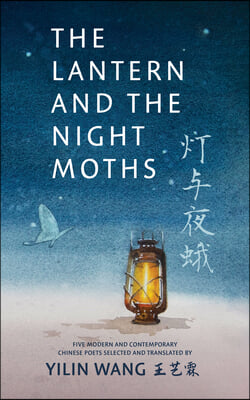Note: I have received an advance copy of The Lantern and the Night Moths to write a review for Exchanges now available on their website and reproduced on this site, but have also pre-ordered it on my own since. This post was adapted from my Goodreads review posted on February 19, 2024. The Lantern and the Night Moths is available whereever books are sold!

The Lantern and the Night Moths (2024 Invisible Publishing) is a collection of modern and contemporary Chinese poetry translated by Yilin Wang and accompanied by Wang’s original essays. The diverse works and voices represented are made accessible by the lyrical, heartfelt translations no matter what the reader’s relationship with the original language: Shaky and uncertain in my case, but with no barriers to non-speakers and likely enjoyable even to fluent Chinese speakers for the lesser-traveled route through modernist Chinese poetry and the author’s deft guide through poetics, literary history, and the art of translation.
It was quite the experience to be immersed in such different ages and styles in one volume, from feminist revolutionary Qiu Jin’s fierce yearnings expressed in classical form, to early modernist Fei Ming’s bridging between the old and new in experimental, enigmatic verse. Poet-translator Dai Wangshu’s wistful reflections, together with contemporary poets Zhang Qiaohui and Xiao Xi’s everyday imagery and vivid poetic language, completed the journey through modernity to the present.
The effect is one of lively dialogue between these remarkable poets through their differences and convergences in style and imagery. “I shall declare, I have swept the dust of the world away,” proclaims the rebellious warrior Qiu Jin, while Fei Ming philosophically muses, “the universe is a particle of indestructible dust floating in the air.” Zhang Qiaohui patiently builds narrative in weighty blocks of language (“a pseudo-classical reconstruction made of bricks and reinforced concrete/It comforts me with its mundanity”) while Xiao Xi throws searing moments packaged in the rhythm of hyper-condensed language that beats with the consciousness of the now (“some people . . . auction their kidneys off to pay for iPhones”). Dai Wangshu, a seasoned flyer between worlds of thought and language, casually melds Asian and European philosophy together (“I think, therefore I am a butterfly…”) and sinks deep into existential meditations that waver like a flame between meanings, skillfully captured by the translator.
A must-read for anyone with a stake in the art of poetry and its translation, The Lantern and the Night Moths is a unique and necessary collection that raises urgent questions about the future of translation and translators in an age of upheaval, where old forms of devaluation and exploitation—as brought home by the British Museum’s uncredited and unpaid use of Wang’s Qiu Jin translations for its 2023 exhibit—coexist with the new in the use of technological sleight-of-hand to erase and appropriate translators’ labor. The Lantern and the Night Moths is both a literary treat and a clarion call that contains multitudes in a slim volume, a celebration, mourning, and hopeful anticipation of what has been and might yet be.